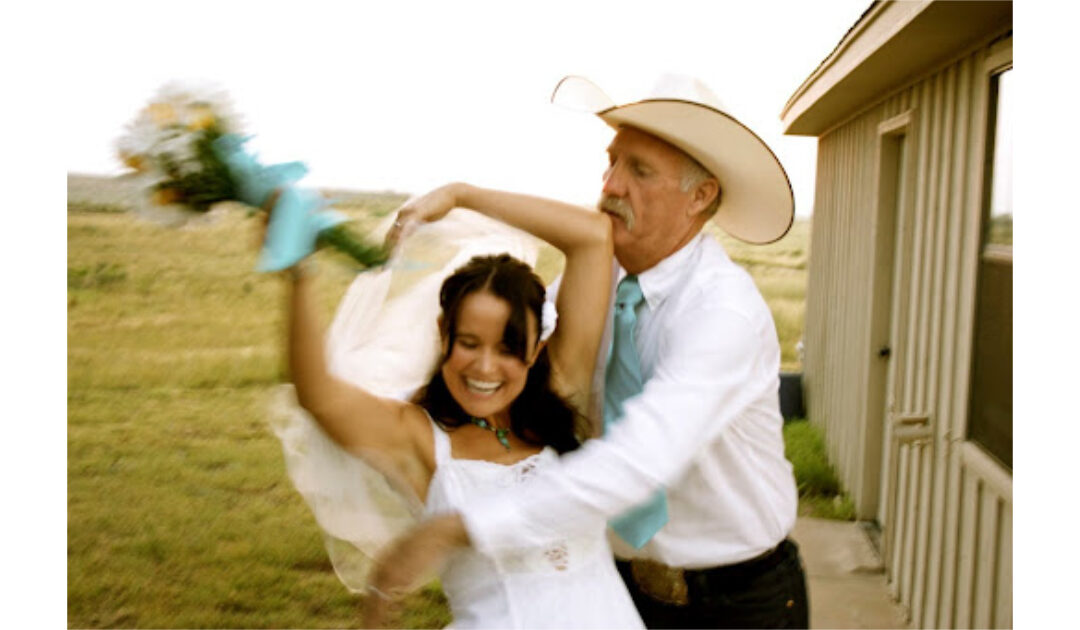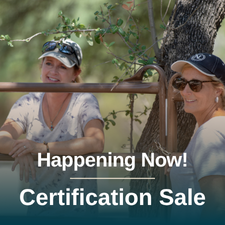By Bettina Shultz-Jobe and Tim Jobe
On August 7th, 2010, Tim and I were married. We had a sunrise wedding at my family’s ranch in the Texas Panhandle. It was outside on a plateau, overlooking a beautiful canyon, so sunrise was about the only time of day we could lessen the chances of enduring ridiculously high and relentless winds––the kind that blows houses over the rainbow, twirls wedding veils into a wadded up mess, and wreaks havoc on a sundry of other wedding delights.
We did our first dance horseback to a country song called I Run to You, and I almost fell from Zeus, my trusted steed. We shared a communion of coffee and homemade biscuits with friends and family during the ceremony. We then had tequila sunrises and a delicious chuck wagon breakfast, prepared by a dear friend. The day was perfect!
It is practically impossible to think about our wedding and engagement, without thinking about our business, our first “baby.” The weeks prior to our wedding we built a website, (with the help of my brother in law), trained our horse, Aries, for the aforementioned wedding dance, set up an LLC, and. . . oh yes––planned a wedding! We simply can’t separate ourselves or our relationship from Natural Lifemanship and the idealized belief system at its foundations.
Many years ago, Tim and I wrote the statement you will read below. Natural Lifemanship has grown well beyond the two of us, but these beliefs are the hands that continue to hold us personally and professionally. They are still the touchstone of Natural Lifemanship’s principle-based and process-oriented approach to therapy and learning.
Moments after we were officially married the wind arrived––and, truly, it has been a whirlwind ever since!
We are terribly imperfect at practicing what we believe and what we teach. I guess this is why we so deeply believe in the power of grace and repair. Tim and I are quite complicated human beings, with all kinds of baggage, and a fly on the wall would attest to how inadequate our best is in the hardest of times. Actually, our closest family and friends can attest to this wholeheartedly, I’m sure.
We are so very different from each other, and there is a rub that doesn’t work each and every moment but does seem to work out most days. So much has changed for us in the last 11 years, but what we believe has not, and our daily choice to try our darndest to care more about connected relationships than anything else remains.
The statement below is found in The Natural Lifemanship Manual, which is intended to serve as a resource to support students’ learning as they move through our Fundamentals and Intensive trainings. It is also what our certification students agree to before they complete certification in Natural Lifemanship.
As Tim and I reflect on how these beliefs have affected our life, our mission, and our passion, we feel infinitely blessed to be part of a community that chooses to attest to such a statement––and humbled by the many people whose work and heart have contributed to our mission––and by each moment’s grace to change, grow, and, above all, connect.
NL Ethics and Beliefs Statement
Committing to weeks, months, or years of learning with a specific teaching organization is also the forming of a new relationship. It is our hope that you do so with a clear understanding of who we are and why we do what we do. Whether you intend to become certified, or are just trying out a training, it is important to us that we “orient” you to The Natural Lifemanship Institute so we begin on a foundation of trust. We want to be in good relationship with you! With that in mind, we have written an NL Ethics and Beliefs Statement that we feel answers the ‘who we are’ and ‘what we do’ question from an existential and ethical standpoint. This is the big picture of Natural Lifemanship and it is a commitment embraced by our certified practitioners. It is our goal that students learning with us will come to understand and integrate these ethics into their own way of being in the world. This statement is included in this manual so that you may know who we are and what we stand for.
As a person certified in Natural Lifemanship I attest to the following:
I believe the most important thing in life is connected, attuned relationships with self, others and the world around me (including relationship with animals, my Creator as I understand him or her, and nature, the universe, etc.) All of life’s healing happens in the context of attuned relationships based on trust, mutual respect, appropriate intimacy, and partnership.
I believe strength is found in vulnerability, and that conflict in relationships can be an opportunity for growth that can strengthen the relationship. Therefore, regardless of the task or activity, a connected relationship with self and others is always the goal.
I believe that a partnership can happen when each party seeks to control or manage themselves only, and true partnership happens when each party appropriately manages themselves for the good of the relationship. I believe that if it’s not good for both, it’s eventually not good for either and that a one-sided relationship is damaging to both parties.
Regardless of what is going on around me, it is possible to control what is happening inside of me. Relationship with self (what we sometimes call self-regulation or my way of being in the world), quite simply, flows out of relationship with others, because effective self-regulation is born out of safe co-regulation. Relationships are then built on the foundation of relationship with self.
Therefore, WHO I am is more important than WHAT I do. I realize that I can’t teach someone to do something I can’t do. Likewise, I can’t teach someone to live a life that I don’t live. As a result, personal growth becomes the foundation for ethical practice.
The most important thing is to do my best to do what is right for my client. I understand that what is best may not be what is easiest. In order to do what is right for my clients, I have to know myself – my biases, my blind spots, and at the moment, I have to be connected with my own reactions and impulses so I can filter them. Only then can I do what is actually, truly best for my client.
The team approach in NL affords me the opportunity to model a relationship where the NL principles play out and provides a space for the therapy or learning team to notice and discuss biases and blind spots. It is, therefore, my ethical obligation to foster a healthy relationship with my therapy partner. Clinical consultation is a regular part of ethical practice, especially if I am, at times, working alone in therapy sessions.
I believe animals are sentient beings, who have relational and thinking capabilities, and can be capable of partnership if given the chance to develop.
I believe that a good principle is a good principle regardless of where it is applied. Therefore, all NL principles apply equally to relationship with self and others. The relationship between horse and human is a real relationship in which relational patterns emerge, just like in any other relationship. All NL principles apply to this relationship as well.
When NL certified, I become part of a community of individuals who are deeply committed to connection with self and others, and who strive for connected relationships the way nature intended. As such, this community of practitioners strives to foster relationships that bring about healing for self, others, and the animal partners with which we work.
________________________________________________________________
We invite you to join our growing NL community where transformation, healing, and purposeful relationships take place. Learning how to best serve your clients and communities is a lifelong and deeply fulfilling journey – we would be honored to join with you on this path.
Registration for the next Fundamentals of Natural Lifemanship training opens in September! This is our most entry level training and is required for all certification paths. We hope you can join us!



Recent Comments